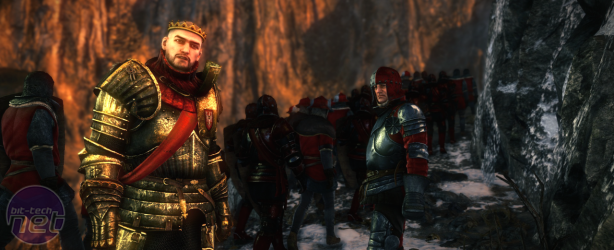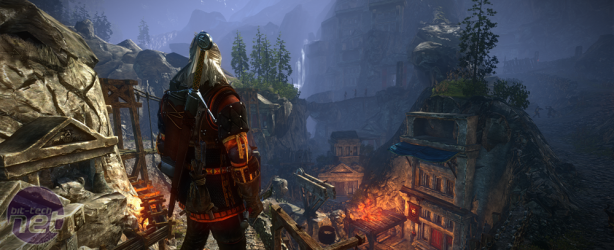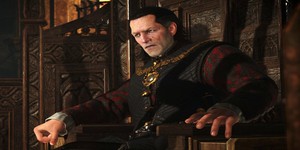
The Witcher 2: Enhanced Edition review
Publisher: Namco Bandai
UK Price: £33.68 (inc VAT)
US Price: $59.99 (ex tax)
The Witcher 2 was one of the best PC games of last year (here's Joe's review of the PC version), so the arrival of this Enhanced Edition is great news, not just for PC players who receive the extra content and updates for free, but also for 360 owners who get to step in the boots of infamous Witcher and monster-slayer, Geralt of Rivia, for the first time.
Though the 360 has its share of quality RPGs, none of them are quite like The Witcher 2, an adult game not because of swearing, sex and violence (though it has its fair share of all three) but because of mature themes and a dense narrative. The main plot isn't especially complex or original, but the stories of alcoholism, terrorism, racism and even marital problems that unravel in the background are unique to The Witcher 2's world, rewarding those who seek them out with touching moments of humour, drama and intrigue.

The story begins with Geralt suffering from amnesia. Though it may be a cheap narrative device, it means newcomers to the series aren’t arriving in the middle of a continuing saga. Some minor references to characters and locations may be missed, but by listening to conversations and reading journal entries it's not hard to keep up, and - new for the Enhanced Edition - an action-packed CGI intro adds extra context, stylishly establishing a fantasy world of magic, kings and assassins.
Geralt's amnesia is a way of resetting the character for newcomers and explaining away the loss of previously acquired skills for players of the first game, but it doesn't alter his personality. Unlike most RPG protagonists Geralt's not a blank slate that can be moulded, he's a Witcher, a mutated human with cat-like eyes, magic powers, two swords, a sorceress girlfriend and a sideline in extreme pest control. It's not possible to go on a random killing spree, hop between distant locations or marry comely wenches, as these events wouldn't fit into his story. Complete player autonomy is swapped for a tight, focused narrative, a trade off that results in well measured pacing.

It’s not possible to do stuff like murder a villager and fill their home with stolen cheese and apples like in Skyrim - you can't even steal cheese or apples - but Geralt does have important decisions to make. Barely signposted and usually with delayed effects, some of Geralt's decisions massively dictate the story's direction, so much so that there are 16 different endings dependent on them. There are no naughty and nice points, and choices often come down to deciding between the lesser of two evils. By replacing black and white with different shades of grey, The Witcher 2 adopts a refreshing approach to morality not usually found in console RPGs, or any genre for that matter.
Over the course of the story, Geralt travels to three main locations, each surrounded by forests, rivers, caves, catacombs and mines, and all the trappings expected from a fantasy setting. Geralt stays in one place until his adventures move him along, allowing him to get to know his surroundings and its inhabitants well. Taking on side-quests is the best way to do this, giving an insight into the lives of some colourful characters.
Publisher: Namco Bandai
UK Price: £33.68 (inc VAT)
US Price: $59.99 (ex tax)
The Witcher 2 was one of the best PC games of last year (here's Joe's review of the PC version), so the arrival of this Enhanced Edition is great news, not just for PC players who receive the extra content and updates for free, but also for 360 owners who get to step in the boots of infamous Witcher and monster-slayer, Geralt of Rivia, for the first time.
Though the 360 has its share of quality RPGs, none of them are quite like The Witcher 2, an adult game not because of swearing, sex and violence (though it has its fair share of all three) but because of mature themes and a dense narrative. The main plot isn't especially complex or original, but the stories of alcoholism, terrorism, racism and even marital problems that unravel in the background are unique to The Witcher 2's world, rewarding those who seek them out with touching moments of humour, drama and intrigue.

It's a dense story, but one that newcomers are welcomed into
The story begins with Geralt suffering from amnesia. Though it may be a cheap narrative device, it means newcomers to the series aren’t arriving in the middle of a continuing saga. Some minor references to characters and locations may be missed, but by listening to conversations and reading journal entries it's not hard to keep up, and - new for the Enhanced Edition - an action-packed CGI intro adds extra context, stylishly establishing a fantasy world of magic, kings and assassins.
Geralt's amnesia is a way of resetting the character for newcomers and explaining away the loss of previously acquired skills for players of the first game, but it doesn't alter his personality. Unlike most RPG protagonists Geralt's not a blank slate that can be moulded, he's a Witcher, a mutated human with cat-like eyes, magic powers, two swords, a sorceress girlfriend and a sideline in extreme pest control. It's not possible to go on a random killing spree, hop between distant locations or marry comely wenches, as these events wouldn't fit into his story. Complete player autonomy is swapped for a tight, focused narrative, a trade off that results in well measured pacing.

There's not quite as much freedom as you may be used to in the game world
It’s not possible to do stuff like murder a villager and fill their home with stolen cheese and apples like in Skyrim - you can't even steal cheese or apples - but Geralt does have important decisions to make. Barely signposted and usually with delayed effects, some of Geralt's decisions massively dictate the story's direction, so much so that there are 16 different endings dependent on them. There are no naughty and nice points, and choices often come down to deciding between the lesser of two evils. By replacing black and white with different shades of grey, The Witcher 2 adopts a refreshing approach to morality not usually found in console RPGs, or any genre for that matter.
Over the course of the story, Geralt travels to three main locations, each surrounded by forests, rivers, caves, catacombs and mines, and all the trappings expected from a fantasy setting. Geralt stays in one place until his adventures move him along, allowing him to get to know his surroundings and its inhabitants well. Taking on side-quests is the best way to do this, giving an insight into the lives of some colourful characters.

MSI MPG Velox 100R Chassis Review
October 14 2021 | 15:04









Want to comment? Please log in.